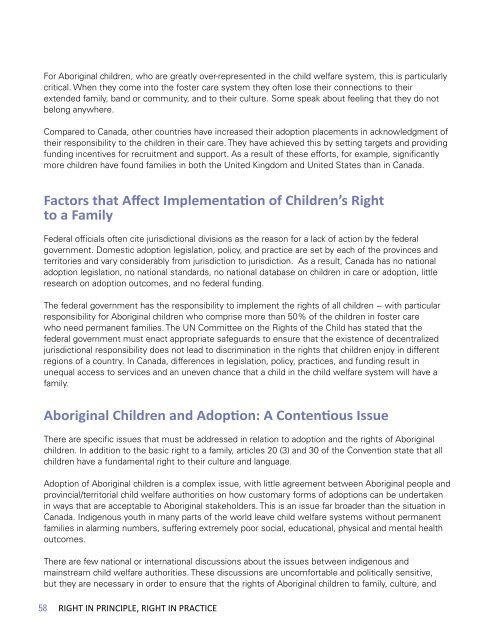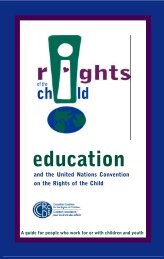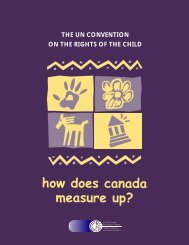CCRC report on rights of children in Canada - Canadian Coalition ...
CCRC report on rights of children in Canada - Canadian Coalition ...
CCRC report on rights of children in Canada - Canadian Coalition ...
Create successful ePaper yourself
Turn your PDF publications into a flip-book with our unique Google optimized e-Paper software.
For Aborig<strong>in</strong>al <strong>children</strong>, who are greatly over-represented <strong>in</strong> the child welfare system, this is particularly<br />
critical. When they come <strong>in</strong>to the foster care system they <strong>of</strong>ten lose their c<strong>on</strong>necti<strong>on</strong>s to their<br />
extended family, band or community, and to their culture. Some speak about feel<strong>in</strong>g that they do not<br />
bel<strong>on</strong>g anywhere.<br />
Compared to <strong>Canada</strong>, other countries have <strong>in</strong>creased their adopti<strong>on</strong> placements <strong>in</strong> acknowledgment <strong>of</strong><br />
their resp<strong>on</strong>sibility to the <strong>children</strong> <strong>in</strong> their care. They have achieved this by sett<strong>in</strong>g targets and provid<strong>in</strong>g<br />
fund<strong>in</strong>g <strong>in</strong>centives for recruitment and support. As a result <strong>of</strong> these efforts, for example, significantly<br />
more <strong>children</strong> have found families <strong>in</strong> both the United K<strong>in</strong>gdom and United States than <strong>in</strong> <strong>Canada</strong>.<br />
Factors that Affect Implementati<strong>on</strong> <strong>of</strong> Children’s Right<br />
to a Family<br />
Federal <strong>of</strong>ficials <strong>of</strong>ten cite jurisdicti<strong>on</strong>al divisi<strong>on</strong>s as the reas<strong>on</strong> for a lack <strong>of</strong> acti<strong>on</strong> by the federal<br />
government. Domestic adopti<strong>on</strong> legislati<strong>on</strong>, policy, and practice are set by each <strong>of</strong> the prov<strong>in</strong>ces and<br />
territories and vary c<strong>on</strong>siderably from jurisdicti<strong>on</strong> to jurisdicti<strong>on</strong>. As a result, <strong>Canada</strong> has no nati<strong>on</strong>al<br />
adopti<strong>on</strong> legislati<strong>on</strong>, no nati<strong>on</strong>al standards, no nati<strong>on</strong>al database <strong>on</strong> <strong>children</strong> <strong>in</strong> care or adopti<strong>on</strong>, little<br />
research <strong>on</strong> adopti<strong>on</strong> outcomes, and no federal fund<strong>in</strong>g.<br />
The federal government has the resp<strong>on</strong>sibility to implement the <strong>rights</strong> <strong>of</strong> all <strong>children</strong> − with particular<br />
resp<strong>on</strong>sibility for Aborig<strong>in</strong>al <strong>children</strong> who comprise more than 50% <strong>of</strong> the <strong>children</strong> <strong>in</strong> foster care<br />
who need permanent families. The UN Committee <strong>on</strong> the Rights <strong>of</strong> the Child has stated that the<br />
federal government must enact appropriate safeguards to ensure that the existence <strong>of</strong> decentralized<br />
jurisdicti<strong>on</strong>al resp<strong>on</strong>sibility does not lead to discrim<strong>in</strong>ati<strong>on</strong> <strong>in</strong> the <strong>rights</strong> that <strong>children</strong> enjoy <strong>in</strong> different<br />
regi<strong>on</strong>s <strong>of</strong> a country. In <strong>Canada</strong>, differences <strong>in</strong> legislati<strong>on</strong>, policy, practices, and fund<strong>in</strong>g result <strong>in</strong><br />
unequal access to services and an uneven chance that a child <strong>in</strong> the child welfare system will have a<br />
family.<br />
Aborig<strong>in</strong>al Children and Adopti<strong>on</strong>: A C<strong>on</strong>tentious Issue<br />
There are specific issues that must be addressed <strong>in</strong> relati<strong>on</strong> to adopti<strong>on</strong> and the <strong>rights</strong> <strong>of</strong> Aborig<strong>in</strong>al<br />
<strong>children</strong>. In additi<strong>on</strong> to the basic right to a family, articles 20 (3) and 30 <strong>of</strong> the C<strong>on</strong>venti<strong>on</strong> state that all<br />
<strong>children</strong> have a fundamental right to their culture and language.<br />
Adopti<strong>on</strong> <strong>of</strong> Aborig<strong>in</strong>al <strong>children</strong> is a complex issue, with little agreement between Aborig<strong>in</strong>al people and<br />
prov<strong>in</strong>cial/territorial child welfare authorities <strong>on</strong> how customary forms <strong>of</strong> adopti<strong>on</strong>s can be undertaken<br />
<strong>in</strong> ways that are acceptable to Aborig<strong>in</strong>al stakeholders. This is an issue far broader than the situati<strong>on</strong> <strong>in</strong><br />
<strong>Canada</strong>. Indigenous youth <strong>in</strong> many parts <strong>of</strong> the world leave child welfare systems without permanent<br />
families <strong>in</strong> alarm<strong>in</strong>g numbers, suffer<strong>in</strong>g extremely poor social, educati<strong>on</strong>al, physical and mental health<br />
outcomes.<br />
There are few nati<strong>on</strong>al or <strong>in</strong>ternati<strong>on</strong>al discussi<strong>on</strong>s about the issues between <strong>in</strong>digenous and<br />
ma<strong>in</strong>stream child welfare authorities. These discussi<strong>on</strong>s are uncomfortable and politically sensitive,<br />
but they are necessary <strong>in</strong> order to ensure that the <strong>rights</strong> <strong>of</strong> Aborig<strong>in</strong>al <strong>children</strong> to family, culture, and<br />
identity are h<strong>on</strong>oured. Given the poor outcomes for <strong>children</strong> who ‘age out’ <strong>of</strong> foster care, this is an<br />
enormous gap <strong>in</strong> social policy that should be addressed as a high priority by the federal, prov<strong>in</strong>cial and<br />
territorial governments.<br />
The Right to Identity<br />
Article 7 <strong>of</strong> the C<strong>on</strong>venti<strong>on</strong> outl<strong>in</strong>es the right <strong>of</strong> an adopted child to a name and to know, as far as<br />
possible, her or his biological parents. Article 8 recognizes the right <strong>of</strong> the child to preserve his or her<br />
identity, <strong>in</strong>clud<strong>in</strong>g nati<strong>on</strong>ality, name and family relati<strong>on</strong>s.<br />
Adopti<strong>on</strong> disclosure and reuni<strong>on</strong> policies vary greatly from <strong>on</strong>e prov<strong>in</strong>ce or territory to another. There<br />
has been little acti<strong>on</strong> <strong>on</strong> the recommendati<strong>on</strong> <strong>of</strong> the UN Committee <strong>in</strong> the C<strong>on</strong>clud<strong>in</strong>g Observati<strong>on</strong>s<br />
<strong>of</strong> the sec<strong>on</strong>d review (para. 31) to amend legislati<strong>on</strong> to ensure birth <strong>in</strong>formati<strong>on</strong> is made available<br />
to adoptees. Although adopti<strong>on</strong> law <strong>in</strong> <strong>Canada</strong> is a prov<strong>in</strong>cial matter, the federal government has<br />
an obligati<strong>on</strong> under the C<strong>on</strong>venti<strong>on</strong> to ensure that the terms <strong>of</strong> the C<strong>on</strong>venti<strong>on</strong> are implemented<br />
throughout all prov<strong>in</strong>ces and territories.<br />
The Right to Equal Parental Leave Benefits for Adopted Children<br />
Currently adoptive parents do not receive the same level <strong>of</strong> parental leave benefits as biological<br />
parents. Adoptive parents have advocated for years for equality <strong>of</strong> benefits. The unequal treatment<br />
raises questi<strong>on</strong>s about implementati<strong>on</strong> <strong>of</strong> the pr<strong>in</strong>ciples <strong>of</strong> “the best <strong>in</strong>terests <strong>of</strong> the child” and n<strong>on</strong>discrim<strong>in</strong>ati<strong>on</strong>.<br />
Inter-country Adopti<strong>on</strong><br />
Article 21 <strong>of</strong> the C<strong>on</strong>venti<strong>on</strong> requires governments that permit <strong>in</strong>ter-country adopti<strong>on</strong> to ensure that the<br />
‘best <strong>in</strong>terests <strong>of</strong> the child’ are the paramount c<strong>on</strong>siderati<strong>on</strong>. Further, <strong>in</strong> article 21 (c), the C<strong>on</strong>venti<strong>on</strong><br />
states that the child must enjoy safeguards and standards equivalent to those exist<strong>in</strong>g <strong>in</strong> the case<br />
<strong>of</strong> nati<strong>on</strong>al adopti<strong>on</strong>. The Hague C<strong>on</strong>venti<strong>on</strong> <strong>on</strong> Protecti<strong>on</strong> <strong>of</strong> Children and Cooperati<strong>on</strong> <strong>in</strong> Respect <strong>of</strong><br />
Intercountry Adopti<strong>on</strong> (the Hague C<strong>on</strong>venti<strong>on</strong>) is an elaborati<strong>on</strong> <strong>of</strong> article 21 <strong>of</strong> the C<strong>on</strong>venti<strong>on</strong> <strong>on</strong> the<br />
Rights <strong>of</strong> the Child.<br />
In the Hague C<strong>on</strong>venti<strong>on</strong>, the central authority, or primary duty-bearer, is obligated to ensure that<br />
the provisi<strong>on</strong>s <strong>of</strong> the C<strong>on</strong>venti<strong>on</strong> are implemented. S<strong>in</strong>ce <strong>Canada</strong> is a federal state and adopti<strong>on</strong><br />
is a prov<strong>in</strong>cial/territorial resp<strong>on</strong>sibility, the role <strong>of</strong> central authority is shared between the federal<br />
government and prov<strong>in</strong>ces and territories. <strong>Canada</strong>’s federal Central Authority, the Intercountry Adopti<strong>on</strong><br />
Services unit <strong>in</strong> Human Resources and Skills Development <strong>Canada</strong>, has allocated limited resources to<br />
adopti<strong>on</strong> and has <strong>in</strong>terpreted its role narrowly. It has been unable to provide prov<strong>in</strong>ces and territories<br />
with timely, current <strong>in</strong>formati<strong>on</strong> as required under article 7 <strong>of</strong> the Hague C<strong>on</strong>venti<strong>on</strong>. It has provided<br />
little <strong>in</strong> the way <strong>of</strong> leadership and coord<strong>in</strong>ati<strong>on</strong> with other federal departments resp<strong>on</strong>sible for aspects<br />
<strong>of</strong> <strong>in</strong>ter-country adopti<strong>on</strong>, and it has limited ability to provide technical support to countries from which<br />
<strong>Canadian</strong>s adopt <strong>children</strong>, to help them fully implement the Hague C<strong>on</strong>venti<strong>on</strong>.<br />
58 Right <strong>in</strong> pr<strong>in</strong>ciple, right <strong>in</strong> practice Enabl<strong>in</strong>g Children’s Full Development 59




